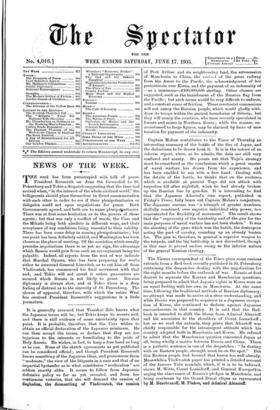President Roosevelt on June 8th forwarded to St. Petersburg and
Tokio a despatch suggesting that the time had arrived when," in the interest of the whole civilised world," the belligerents should place themselves in direct communication with each other in order to see if their plenipotentiaries or delegates could not open negotiations for peace. Both Governments agreed, and both are to name plenipotentiaries. There was at first some hesitation as to the powers of these agents ; but that was only a conflict of words, the Czar and the Mikado being both absolute in different ways, and their acceptance of any conditions being essential to their validity. There has been some delay in naming plenipotentiaries ; but one point has been definitely settled, and Washington has been chosen as the place of meeting. Of the armistice which usually precedes negotiations there is as yet no sign, the advantage which Russia would gain from such an arrangement being too palpable. Indeed, all reports from the seat of war indicate that Marshal Oyama, who has been preparing for weeks either to surround General Linevitch, or to cut him off from Vladivostok, has commenced his final movement with that end; and Tokio will not arrest it unless guarantees are secured which Russia is not likely to grant. Russian diplomacy is always slow, and at Tokio there is a deep feeling of distrust as to the sincerity of St. Petersburg. The chorus of approval, therefore, with which the entire West has received President Roosevelt's suggestions is a little premature.






































